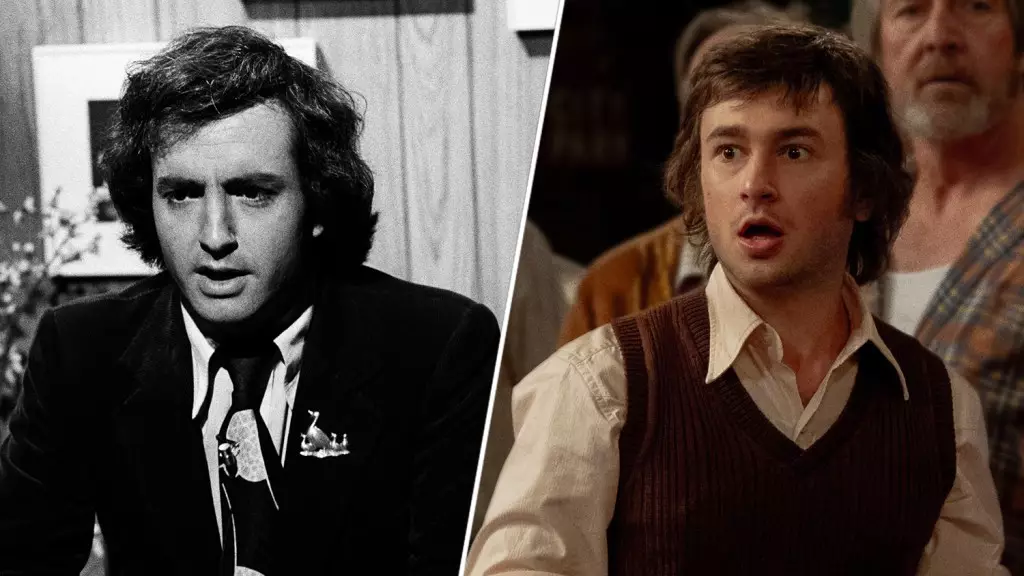The history of television comedy would be incomplete without acknowledging the cultural phenomenon that is “Saturday Night Live.” As this iconic show continues to shape the comedic landscape, the film “Saturday Night,” which delves into the behind-the-scenes dynamics of its inception, promises to offer viewers an intriguing glimpse into a transformative moment in entertainment history. With actor Gabriel LaBelle embodying the role of SNL’s legendary creator, Lorne Michaels, the narrative not only captures the trials and triumphs of the groundbreaking show but also presents an unforgettable chronicle of ambition, creativity, and collaboration.
Gabriel LaBelle recently recounted his experience immersing himself in the world of SNL, notably during an exclusive visit to 30 Rockefeller Plaza, the show’s home. As he takes on the complex character of Michaels, LaBelle was fortunate enough to attend a live taping of the show—an opportunity that most aspiring actors could only dream of. His enthusiasm is palpable as he recalls the electric atmosphere of the studio, where he had a chance to watch Josh Brolin perform live. By being part of this experience, LaBelle was not merely acting; he was absorbing the essence and spirit of a show that has influenced countless comedians and writers.
Meeting the very man he portrays—Lorne Michaels—affords LaBelle a deeper understanding of the enigmatic executive producer’s vision and personality. Engaging briefly with Michaels post-show, LaBelle acknowledges the significance of this connection, noting that while they did not have an in-depth conversation, the encounter remains a cherished memory. This illustrates the profound impact that genuine human interaction can have on an actor’s performance, lending authenticity and relatability to their portrayal.
Director Jason Reitman’s commitment to authentically capturing the essence of SNL shines through as he actively engages with Michaels throughout the filmmaking process. This relationship underscores the careful consideration taken in portraying the historical context of the show’s early days. Set against the backdrop of October 11, 1975, “Saturday Night” encapsulates a vital moment when a band of innovative comedians set out to reshape the television comedy landscape.
Reitman candidly expresses his own uncertainties regarding Michaels’s reception of the film. With Michaels being a person of few words, the anticipation surrounding his response adds an element of intrigue and speculation to the project. This interplay between filmmaker and subject reflects a dynamic often experienced in biopics, where the representation of real individuals can evoke varied emotions—whether admiration, defensiveness, or skepticism.
In addition to LaBelle, “Saturday Night” boasts a remarkable ensemble cast that breathes life into the comedic talents who, at the time, were incredibly ambitious yet largely unknown. Each actor has meticulously crafted their character, aiming to portray not just their on-screen personas but the essence of what each brought to SNL. From Rachel Sennott as Rosie Shuster to Willem Dafoe as David Tebet, the film is rich with nuanced performances that illustrate the camaraderie and rivalries that fueled the early days of SNL.
The casting decisions also suggest a careful balance between honor and admiration for the show’s legacy, while firmly rooting the narrative in history. The film stands as a testament to the path these pioneering comedians carved in the industry and examines the relationships that formed during a critical time of creative exploration and experimentation.
As viewers anticipate the official release of “Saturday Night,” scheduled for October 11, the excitement surrounding the film is palpable. This narrative not only sheds light on the evolution of SNL itself but also provokes broader discussions on the changing landscape of comedy and television. The film emerges at a time when the universal appeal of and hunger for comedic content remains strong, prompting audiences to reflect upon the origins of such cultural milestones.
Whether audiences are already devoted fans of SNL or simply curious about the history of American comedy, “Saturday Night” encapsulates a pivotal moment that established the groundwork for future comedians. By exploring the fabric of these early experiences and the individuals who dared to reshape it, the film provides both a nostalgic journey and a contemporary analysis of what it means to innovate in the world of comedy. The complexities of ambition, friendship, and creativity resonate throughout this cinematic portrayal, making it a must-watch for aspiring artists and comedy enthusiasts alike.


Leave a Reply